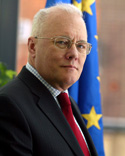Bomb scare after Slovakia insists new language law is legitimate
 Budapest - Bomb disposal experts were called to a Slovak cultural institute in Budapest on Monday after a package marked "Caution: bomb!" was found at the door.
Budapest - Bomb disposal experts were called to a Slovak cultural institute in Budapest on Monday after a package marked "Caution: bomb!" was found at the door.
A few hours earlier at a separate venue, the Slovak ambassador to Hungary, Peter Weiss, insisted that the controversial new legislation controlling the use of minority languages in public discourse is in line with international norms.
Police told the state news agency MTI that the package, also daubed with anti-Slovak comments, proved to be harmless.
Meanwhile, Hungary's foreign minister, Peter Balazs, said after a parliamentary committee meeting that the "political will" was there for a meeting between Prime Minister Gordon Bajnai and his Slovak counterpart, Robert Fico.
Balazs cautioned, however, that such a meeting would be pointless unless Slovakia is prepared to discuss the language law.
Despite the insistence of the Slovak government that it seeks only to protect Slovakia's cultural heritage, many Hungarians are concerned that the new legislation will be used to discriminate against the country's half-million-strong Hungarian-speaking minority.
The new Slovak legislation, set to come into force on September 1, could punish the inappropriate use of minority languages with fines of up to 5,000 euros (7,145 dollars).
Last week, Molotov cocktails were thrown at the Slovak Embassy in Budapest, although they failed to explode.
Speaking to reporters in the Hungarian capital, Weiss said the Slovak government's position was backed up by Knut Vollebaek, High Commissioner on National Minorities with the Organization for Security and Cooperation in Europe.
Weiss insisted that the law was not designed to punish individuals and is aimed rather at state and public institutions.
The maximum penalty would be used only in cases such as flouting the law in large advertising campaigns, the ambassador said.
Slovakia is not preparing to "send out language commandos tomorrow," Weiss said.
Relations between neighbouring Slovakia and Hungary, both European Union member states, have become increasingly chilly since 2006, when a new coalition government, including the hard-line nationalist Slovak National Party, took office.
A fresh nadir was reached on August 21, when Hungarian President Laszlo Solyom was told through diplomatic channels not to attend the unveiling of a statue of King Stephen I in Komarno, a Slovak town where a majority speak Hungarian.
The Hungarian Coalition Party, which represents the Hungarian minority in the Slovakian parliament, plans to hold a demonstration against the language law at a stadium in the Slovak town of Dunajska Streda on Tuesday. dpa